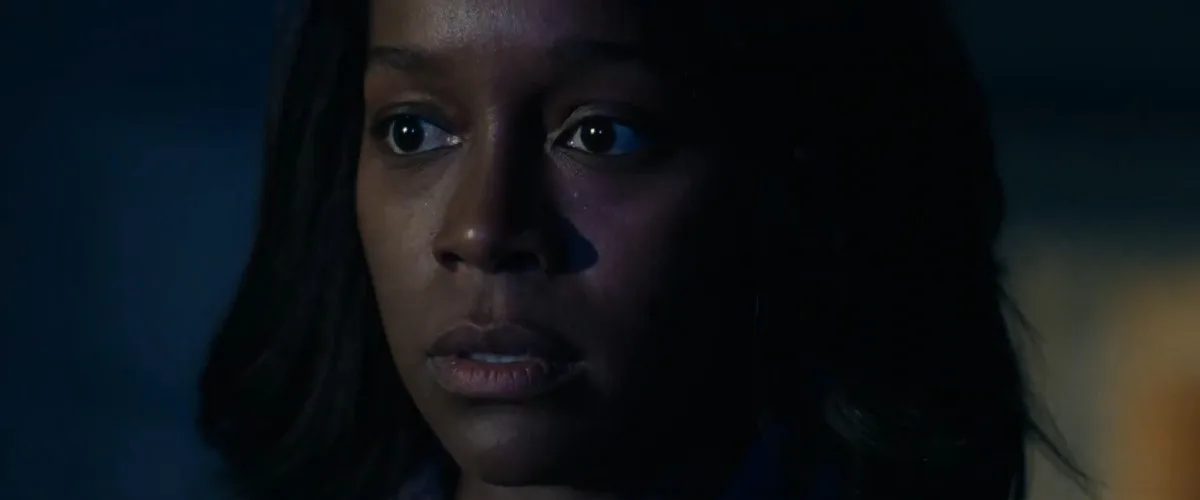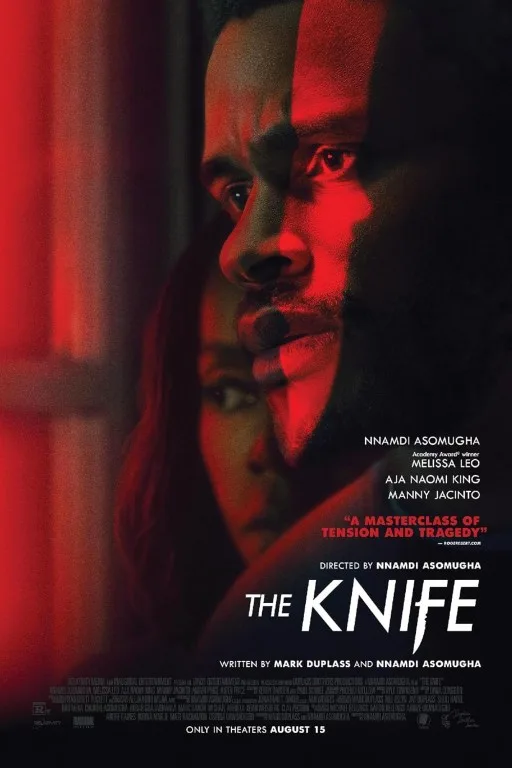“Life presents choices and choices lead to consequences,” Chris (Nnamdi Asomugha) recalls his grandmother saying to him. A construction worker and father, Chris is passionately renovating his family’s new home when we first meet him. Tired and weary, he lovingly says goodnight to his daughter, Kendra (Amari Price), and Ryley (Aiden Price) before crawling into bed with devoted wife Alexandra (Aja Naomi King). A slumbering Chris, however, is awoken by a sound in the middle of the night, provoking him to wander his home. He discovers his glass door is ajar and a woman is standing with her back to him in the middle of his kitchen. Before Chris knows it, not only is the woman lying unconscious on his floor. He can’t remember whether he hit her or not.
A worst day in your life type film, Nnamdi Asomugha’s directorial debut “The Knife” unsurprisingly plays on the racial fears of the moment. A white woman might be potentially dying on this Black family’s floor. Naturally, they don’t want to cover up the crime, so they nervously call the police and get their stories straight. Alexandra even plants a knife on the unconscious woman for good measure. Maybe they wouldn’t need to fabricate a narrative if Chris, who took some prescription pills before bed, could remember the exact sequence of events. But as Alexandra pointedly says in a bit of dialogue that’s too blunt to be piercing, “You’re a black man in America, Chris.”
Though the family might be wary of misspeaking around the cops, as a film, “The Knife” isn’t trying to be evasive. It’s a fairly predictable thriller with few emotional moments apart from anxiety, and even fewer revelations. The melodrama is expectedly increased when the savvy, seemingly kindhearted Detective Carlsen (Melissa Leo) arrives to investigate the case. The single location of the family home minimizes any chance for any environmental surprises, causing the film to appear stagey. Even the score, which is fairly minimal, does little to alter one’s initial assumptions.
Penned by Mark Duplass and Asomugha, “The Knife” is a safe, straightforward debut for Asomugha the filmmaker. We mostly spend this lone night following Detective Carlsen as she methodically questions each family member. Luckily, sturdy performances from the likes of King and Asomugha restrict the thriller from becoming too overwrought. A measured Leo gets the best scenes, slicing through heated moments, such as when Detective Carlsen begins questioning the children, with an ease that belies her intensity. That’s because, despite Detective Carlsen’s calm demeanor, she’s a great danger to a family desiring to literally build a life in their new home. She is the representative of a bureaucratic state, and the state does not feel.
There’s some evocative camerawork by DP Alejandro Mejia featuring plenty of tilts and pans, which often holds editor Dana Congdon’s kinetic cuts at bay from trying too hard to evoke what a scrambled memory looks like. Sometimes Mejia’s tilts and pans feel like POV shots, but it’s not altogether clear from whose perspective we’re seeing the action. Because Detective Carlsen is always harping about finding an objective truth, we’re left to assume the camera is assuming an omnipresent viewpoint. If that’s the case, then one wishes the film played with that perception more. One wishes this film didn’t center frame so much either. While the center framing can certainly inspire claustrophobic paranoia, it persistently feels like, particularly under the film’s blue lighting, that the visual intensity could be further ratcheted up by presenting some idiosyncratic compositions.
Once again, there’s nothing necessarily wrong with “The Knife.” It’s a well-acted, competently filmed work that ends on a gut-wrenching note. But in its interrogation of a system and police force whose inherent racism forces Black folks to tell anything but the truth, it never pulls a new lever or uncovers a new line of attack. And maybe that’s the point. Heartbreaking stories like this are so commonplace that they rarely feel surprising.




















